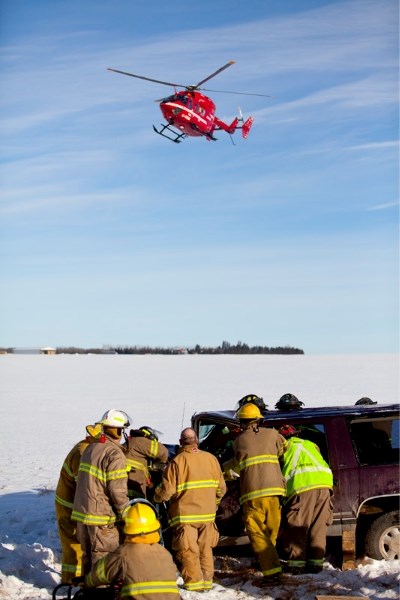Mountain View County council will be asked this week to consider a more-than-fivefold increase in its funding to STARS Air Ambulance.The increased amount of $24,718 is based on the county's population and calculated at a rate of $2 per capita. With $4,500 already budgeted this year for STARS, the request going before council this Wednesday is to provide an additional $20,218 for the service.Speaking to council's policies and priorities committee on May 23, STARS Foundation representative Pamela Ison Reilander said the non-profit air ambulance service has targeted $2 per capita for municipal contributions.“We are well on our way to achieving one of our goals – 100 per cent participation,” Reilander said.STARS flew 803 missions in Mountain View County between 1985 and 2008, according to the organization's records. Of the 169 missions flown between 2009 and 2011, 76 were from the Sundre area, 41 from Olds, 34 from Didsbury, 13 from Carstairs and five from Cremona.Mountain View County has funded STARS for 18 years, starting at $5,000 and reducing the contribution to $4,500 since 2007, except for 2011 when the amount dropped to $3,800.Alberta Health provides an annual grant of $5.488 million to STARS but that amount covers only about 25 per cent of total mission costs. For the remaining 75 per cent STARS relies on donations from individuals, service groups, businesses and municipalities, and collaborative agreements with provincial governments.During Reilander's presentation, Reeve Bruce Beattie pointed out the list of contributing Alberta municipalities did not include the cities of Red Deer, Calgary or Edmonton.“It seems a bit surprising that these municipalities aren't contributing to STARS,” Beattie said.Reilander said STARS is “still negotiating” with the big cities.Div. 7 Coun. Al Kemmere, citing council's strategic goal to maintain safe communities, recommended the $2-per-capita funding request come back to the table.“All I'm saying is bring it back for discussion,” Kemmere said.In its report to council, administration said the $20,218 could be funded from the tax rate stabilization reserve or the public transportation reserve. The request could also be denied or a smaller amount could be allocated, the report said.The public transportation reserve, the usual source of STARS funding, “is under significant pressure and will be depleted by 2015 if additional contributions are not added to the reserve to maintain its balance,” said the report. “Use of this reserve will need to be examined and realigned with council's goals during 2013 budget deliberations.”STARS is a charitable, non-profit organization, and the STARS Foundation is the fundraising arm of the organization. Funding is met through donations received from individuals, service groups, business and corporations, municipalities, and through collaborative agreements with provincial governments.The incredible ongoing support of the community helps us continually enhance our innovative and leading-edge air medical programs and service.FUNDING DETAILSAlberta Health Services has agreed to support STARS with $5.488 million annually from 2010 to 2020. Approximately 25 per cent of STARS total mission costs is funded by Alberta Health Services and the remaining 75 per cent comes from fundraising and community partnerships.STARS total operating expenses in 2009 were approximately $27 million of which $23.7 million were mission operations.On April 1, 2010, Alberta Health Services assumed responsibility for ensuring air ambulance services are available across the province. In addition to STARS, which provides dedicated rotary air ambulance through the affiliation agreement, fixed wing air ambulance services will continue to be conducted by 12 providers contracted by Alberta Health Services.As part of this partnership, STARS also facilitates a critical care transport medicine education program for all air medical personnel (fixed wing and rotary) in the province. This provides consistent training and equitable education opportunities. STARS also coordinates the movement of critically ill patients from rural hospitals to larger centres.



